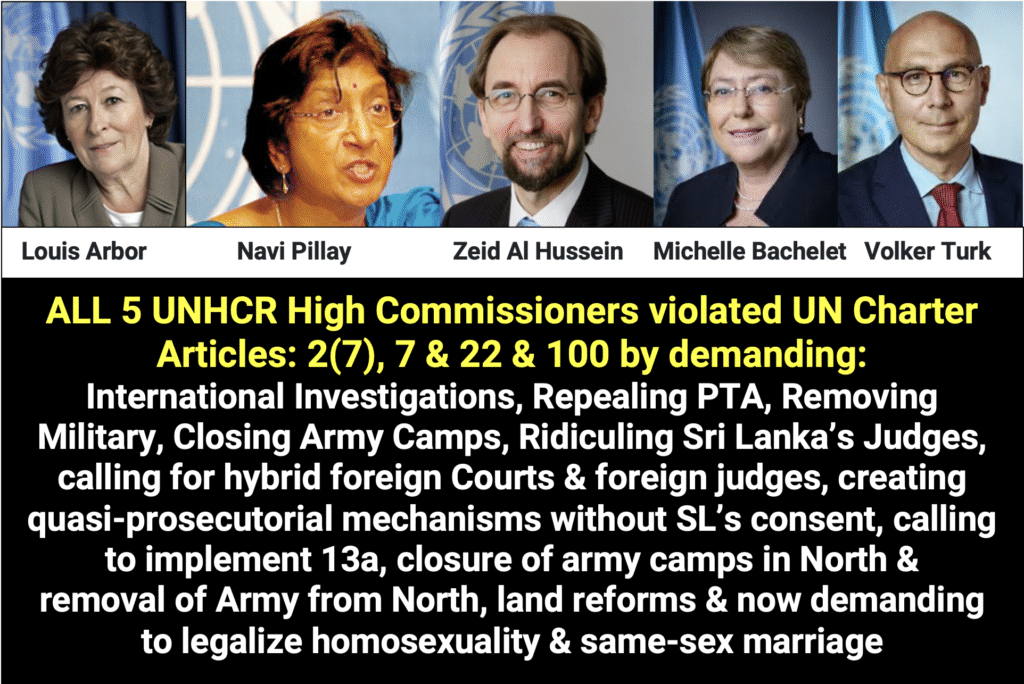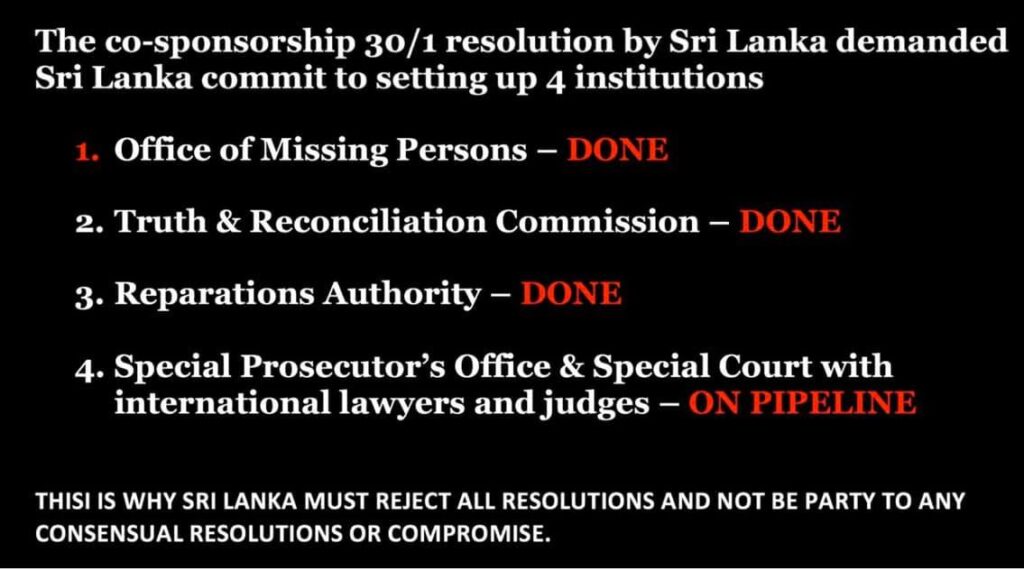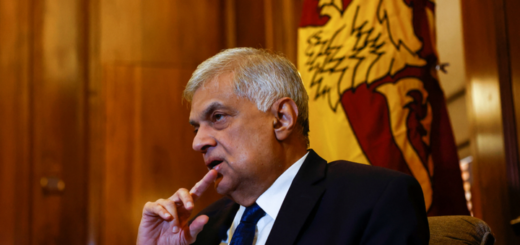UNHRC High Commissioners’ Bias & UN Charter Violations: Sri Lanka 2006–Present

The following summarizes how successive UN High Commissioners for Human Rights have, through their actions and demands, overstepped their mandates, ignored their oath to the UN Charter and violated international law and Sri Lanka’s sovereignty.
-
Violation of UN Charter Article 2(7): Non-Intervention in Domestic Jurisdiction
The UNHRC/OHCHR have repeatedly intervened in Sri Lanka’s internal affairs without Security Council authorization or Sri Lanka’s consent, violating the principle of sovereign equality.
Demands Demonstrating this Violation:
- Louise Arbour (2004-2008): called for “arms-length international investigations” during active conflict.
- Navi Pillay (2008-2014): demanded repeal of Sri Lanka’s Prevention of Terrorism Act (PTA), criticized military presence, checkpoints, surveillance in North & East & made statements about land in N & E without evidence. Urged the Government to “formulate and rigorously enforce a zero tolerance policy for sexual abuse” by military personnel and to “initiate a meaningful and transparent reduction of the military presence to peacetime levels” again creating a notion of a non-existent issue. Called for the implementation of 13a & truth, justice, reprations.
- Zeid Al Hassen (2014-2018: insisted on hybrid courts overriding Sri Lanka’s constitutional judicial authority. His attention was on Sri Lanka’s judicial system & during his visit to Sri Lanka he claimed Sri Lanka’s judiciary was “highly politicized, unbalanced & unreliable”. He went on to claim that Sri Lanka’s justice system was incapable of handling international crimes emphasizing the need for hybrid courts. “It is, I believe, an inescapable reality that Sri Lanka’s criminal justice system is not yet ready to handle these types of crimes … this is why the establishment of a hybrid special court … is so necessary.” Such statements amounted to near contempt of court undermining Sri Lanka’s judiciary’s integrity & public trust. His denouncements directly challenged the independence & authority of Sri Lanka’s highest courts & its judges infringing their constitutional status.
- Michelle Bachelet (2018-2022): establishment of Sri Lanka Accountability Project (SLAP/OSLAP) via Resolution 46/1 in 2021 evidence mechanism without Sri Lanka’s approval. It functions as a prosecutorial office. She called for the immediate moratorium for repeal of Prevention of Terrorism Act. She criticized militarization of civilian functions & called for vetting of military officials, urged reduction of military presence & removal of policing or administrative roles by security forces. She demanded swift restoration of autonomy of the judiciary, human rights commission & police oversight bodies. She encouraged member states to pursue universal jurisdiction prosecutions, targeted sanctions (asset freezes/travel bans) against select members of Sri Lanka Armed Forces without authorization of UNSC. She called for investigations into enforces disappearances, reparations for victims.
- Volker Türk:(2022-present) Demanded legislative changes to repeal Prevention of Terrorism Act & release detainees, repeal Online Safety Act) legalizing of homosexuality & same sex marriage ignoring cultural and religious norms. Continues to demand removal of military camps, reduction of military, return of lands, reforms to police & security sector.
Note:
The Sri Lanka Accountability Project (SLAP), also known as OSLAP, established by UNHRC Resolution 46/1 (2021), mandates the OHCHR to collect, consolidate, analyze, and preserve information and evidence regarding alleged human rights and humanitarian law violations during and after the Sri Lankan conflict.
SLAP is not the first of its kind; it follows precedents such as the International, Impartial and Independent Mechanism (IIIM) for Syria (established by UNGA) and the Independent Investigative Mechanism for Myanmar (IIMM) (established by UNHRC).
SLAP’s mandate effectively creates a quasi-prosecutorial evidence-gathering mechanism without Sri Lanka’s consent, thereby bypassing the country’s domestic judiciary and undermining its sovereignty (allegedly violating UN Charter Article 2(7) and Sri Lanka’s Constitution). Critics also highlight its selective focus and lack of democratic oversight, arguing it represents a clear instance of UN mandate overreach and interference that contradicts the principle of subsidiarity in international law.
As you can see the emphasis of the High Commissioners ridiculing Sri Lanka’s judiciary, judges & judicial system is to enforce a hybrid court.

Relevant Treaty Violations:
- Vienna Convention on the Law of Treaties (1969), Article 26: Pacta sunt servanda — parties must perform treaties in good faith. Overstepping mandates breaches this.
- International Covenant on Civil and Political Rights (ICCPR), Article 2(1): States have primary duty to protect and promote human rights within their territory. External imposition undermines this.
- UN Basic Principles on the Independence of the Judiciary (1985): The independence of the judiciary must be guaranteed by the state itself; external interference violates this.
- Universal Declaration of Human Rights (UDHR), Article 21(3): The will of the people as the basis of authority is to be respected — external imposition disregards democratic sovereignty.
-
Violation of UN Charter Articles 7 & 22:
Exceeding the OHCHR’s Statutory Mandate
The High Commissioners created or endorsed quasi-judicial investigative mechanisms not authorized by the UN General Assembly or Security Council.
Demands Demonstrating This Violation:
- Louise Arbour (2004–2008): called for external inquiries without General Assembly or Security Council mandate. OHCHR does not have authority to establish or endorse investigative panels or quasi-judicial bodies.
- Navi Pillay (2008-2014): advocated for independent international inquiries & indirectly promoted ICC referral without UNSC authorization. Created pressure for judicial action, interfered in internal affairs of Sri Lanka & exceeded OHCHR’s mandate limited to monitoring & promotion.
- Zeid Ra’ad Al Hussein (2014-2018): Pressed to create hybrid courts with international judges & prosecutors outside UNGA/UNSC mandate. OHCHR is not a judicial or prosecutorial body, to impose judicial structures
- Michelle Bachelet (2018-2022): Spearheaded UNHRC Resolution 46/1 & established SLAP/OSLAP – a quasi-prosecutorial evidence-gathering mechanism without Sri Lanka’s consent or UNGA/UNSC authorization. This created an investigatory/prosecutorial function that is not within OHCHR’s legal authority.
- Volker Turk (2022-to present) – Continued endorsement & operational support for SLAP/OSLAP & called for international accountability mechanisms without UNGA or UNSC authorization. These continued actions maintaining extrajudicial prosecutorial mechanism beyond OHCHR’s remit is a violation of the UN Charter & UNHRC’s own mandate.
Relevant Treaty and UN Instrument Violations:
- UNGA Resolution 60/251: Limits Human Rights Council’s mandate to promotion and dialogue, excluding judicial enforcement.
- UN Charter Article 7 & 22: OHCHR is a subsidiary organ with limited functions; unauthorized judicial or prosecutorial actions exceed mandate.
- UN Basic Principles on the Role of Lawyers (1990): Fair trial and legal representation are to be protected domestically, not undermined by external panels.
- International Covenant on Civil and Political Rights (ICCPR), Article 14: Right to fair trial within one’s own legal system; external judicial mechanisms violate this.
-
Violation of UN Charter Article 100:
Failure to maintain neutrality and impartiality
High Commissioners have shown consistent bias by focusing solely on Sri Lanka while minimizing LTTE atrocities, aligning with politically motivated diaspora and NGO narratives.
Key Conduct Demonstrating This Violation:
- Ignoring accountability of LTTE war crimes and terrorism over 30 years.
- Avoiding meetings with Sinhala, Tamil, and Muslim victims of LTTE.
- Favoring LTTE-linked activists and ignoring government security officials.
- Echoing diaspora and NGO narratives linked to LTTE sympathizers.
Relevant UN Ethical Codes:
- UN Staff Regulations and Rules, Regulation 1.2 and Staff Rule 101.2: UN officials must maintain impartiality, neutrality, and act in the interests of the UN alone.
- UN Code of Conduct for Law Enforcement Officials (1979): Requires unbiased investigations and accountability.
- UN Human Rights Council Advisory Committee Guidelines: Emphasize equal treatment and impartiality in human rights matters.
Additional Relevant Points:
Do UN High Commissioners Take an Oath?
- UN High Commissioners for Human Rights are senior UN officials who swear to uphold the UN Charter, Staff Regulations, and Code of Conduct, committing to impartiality, independence, and respect for sovereignty and human rights norms. Violations of these principles breach their professional and legal obligations. Obviously all 5 high commissioners are guilty.
-
Violation of Sri Lanka’s Constitutional Provisions:
- Article 1(1):“Sri Lanka is a sovereign, democratic and unitary State.”
- Article 2(1):“The Republic of Sri Lanka shall be a sovereign Republic.”
- Article 3: “Sovereignty of the People — In the Republic of Sri Lanka sovereignty is in the People and is inalienable…”
- Article 4: “The exercise of sovereignty shall be through… Parliament, the President and the Judiciary as established by this Constitution.”
- Article 9:“The Republic shall… protect and foster the Buddhist Sasana and also protect freedom of thought, conscience and religion of all citizens.”
Chapter XV (Articles 105–117): Establishes judiciary independence.
- Article 105 (1); Establishes courts for the administration of justice.
- Article 107 (2):Protects judicial independence. Ensures independence of the judiciary; Judges can only be removed through parliamentary process on grounds of proven misconduct/incapacity.
- Article 111C:Interference with the judiciary is a punishable offense.
Chapter XVI (Articles 118–147): Confers sole and exclusive constitutional jurisdiction on the Supreme Court for constitutional interpretation, validity of legislation, and fundamental rights enforcement.
- Article 118:Supreme Court is the highest and final superior court.
- Article 120:Supreme Court has sole jurisdiction over constitutional matters.
- Article 125:Supreme Court has sole jurisdiction in interpreting the Constitution.
- Article 126:Supreme Court has jurisdiction on fundamental rights violations.
Since 2006, UNHRC High Commissioners have violated:
- UN Charter Articles 2(7), 7, 22, and 100 by violating sovereignty, exceeding mandates, and lacking impartiality.
- International treaty law (Vienna Convention, ICCPR, UDHR, Basic Principles on Judiciary and Lawyers).
- Sri Lanka’s Constitution, which affirms sovereignty, judicial independence, cultural/religious protections, and supremacy of national law.
Their persistent external impositions, legal reforms demands, and selective accountability undermine international law, Sri Lanka’s sovereignty, and true reconciliation.
What can Sri Lanka’s Government and Citizens do against this bias:
- Legally contest UNHRC/OHCHR overreach citing UN Charter, international treaties, and Sri Lanka’s constitutional provisions.
- Publicly expose politicization and mandate abuses through media, social networks, and diplomatic forums.
- Engage UN member states and civil society to restore mandate boundaries and impartiality.
- Submit credible alternative reports highlighting LTTE atrocities and selective enforcement.
- Demand independent oversight of OHCHR actions related to Sri Lanka from 2006 to present.
Shenali D Waduge







